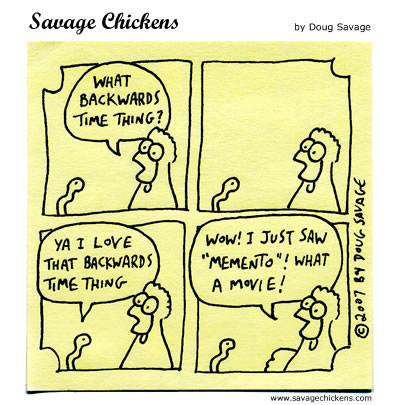Stranger than Fiction was concerned about the end of the story. We know it was apparently an excellent novel--Harold and Professor Hilbert tell us that--Harold begging her to keep it the same, and Professor Hilbert asking Harold to go through with the ending. But when Karen decided to change the ending of her book, Professor Hilbert became concerned, saying the ending made the book, that it wouldn't be the same, or near as good with a different, "happy" ending. The story suddenly became less interesting with a happy ending, with a "storybook" ending. Does that mean stories can't be interesting and happy? Or how much does a crucial event, like the death of a character, influence the captivation the story has on the audience?
Memento has no problem captivating an audience. It's choppy, repetitive (but not necessarily in a helpful way), and confusing. It moves backwards while cutting between scenes of a phone conversation that takes up much less time that rest of the story--though is told along side the story, making it seem almost like it's taking up as much time as the entirety of the story. We almost unquestioningly align ourselves with Leonard while still trying to keep alive a healthy skepticism about just how reliable our short-term-memory-lost narrator can be. By the end the only thing we know for sure is that we can't trust Natalie and that Leonard has killed a couple of people. And that makes the story super interesting. We want to watch it again. We want to know exactly what happened. In class we discussed what the film would have been like had it happened in correct chronological order. Would it have been as interesting? Probably not.

Adaptation. was focused on something entirely different. Charlie wasn't concerned with timing the story, but how to make the story watchable in the first place. The original story is interesting, but extremely difficult to make into an interesting film. How does changing the medium affect the impact of the story? Charlie struggled with how to make a film out of everyday events--where people don't change or have epiphanies; where nothing really happens. In the end the film becomes an abomination of serial appropriations--designed to make films interesting.
Emma is, quite literally, a book about almost nothing. It's 400 pages of talk, and frolic, and "petty" worry, but it manages to still invite our attention. Why? Because it speaks to us as people. It is relatable, at times tragically funny, and always honest. We identify with Emma even when we hate ourselves for being so mean. It's a good story because it reveals something to us about ourselves. But does that make a good film? Many of the filmed adaptations of Emma emphasize the relationship she enters into at the end, and her change leading up to it. Do films need to be more direct and exaggerated for us to find them worthwhile?

What are your favorite types of movies? What makes them so watchable?
